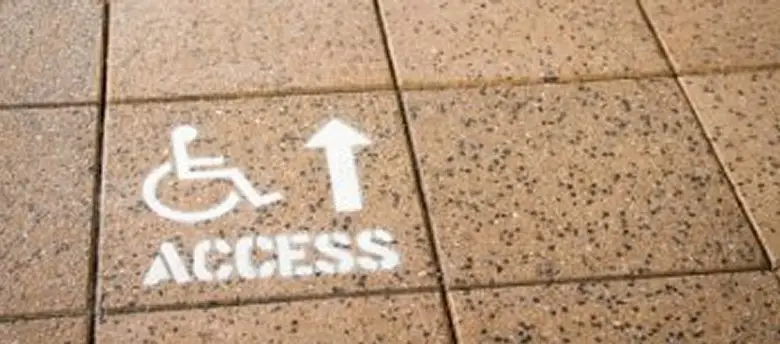
What is access?
Access auditor Iyiola Olafimihan, who uses both a wheelchair and crutches, talks to Disability Horizons about accessibility in entertainment venues, and how the word ‘accessible’ doesn’t always mean somewhere is.
Deaf and disabled people have fought for years to have a fully accessible environment. Many have declared that what disables us is not our impairments, but the way society is organised to deny us access and an equal right to live as we choose.
People have chained themselves to buses demanding to be heard. We recently marched through the streets of London decrying the unjust reduction of benefits that enabled us to live dignified and independent lives.
But this article is not about the history of how disabled activists in Britain fought for certain rights. This article is about what services, such as theatres or entertainment venues, consider as meeting our “access needs” under the Equality Act 2010.
Accessing goods and services is a major part of, not only the UK disability regulations, but is also an important factor in giving disabled people equality and inclusion into society. The law requires that services provided to the public should, with some conditions, meet certain access requirements for deaf and disabled people. But does this really make a venue fully accessible?
I know accessibility is quite complex. I can assure you it is very difficult to meet all access requirements for every disability. For example, I use both crutches and a wheelchair. When I use my wheelchair, an accessible loo is indeed accessible; the sink is at the right height and there is room to manoeuvre around. But when I use my crutches and enter a wheelchair accessible loo, the sinks are just too low and inconvenient.
Access in the UK is mainly about meeting access requirements of wheelchair users, visually impaired people and, to some extent, deaf and those hard of hearing. Once you include a disabled toilet, ramps or lifts with tactile buttons and a hearing loop, some service providers usually think they have made the venue fully accessible.
Now consider two examples of venues that largely fulfilled these standards, but still didn’t meet my access requirements. In November I went to see Seun Kuti play at The Forum, in Camden Town. When I booked the ticket I informed them that I was a disabled person and I would be coming in my wheelchair. I was assured that there is a wheelchair space and there would be no problem. The ticket office suggested that I arrive fifteen minutes before the show began, so we could settle in before the crowd started arriving.
Okay, maybe I am a bit fussy but the so-called wheelchair space was fenced off by iron barricades that made me, the only wheelchair user on the night, look like a caged animal, a specimen; “hey guys there is the wheelchair guy in a cage.”
To access the accessible loo we had to get a staff member to clear the ramp, which was being stood on by a number of people trying to get a better view of the stage! Then, when my friends wanted to join me, they were told only my ‘carer’ was allowed to be there with me!
The next day I was invited by a close friend to go and watch a West African festival at the Rich Mix in Shoreditch (I know, a very busy musical weekend for me!). I asked her about arrangements for disabled visitors and she said the ticket officer had told her the venue was accessible; a front ramp, accessible loo and a lift.
I don’t know if you have been to the Rich Mix before, but it’s a small venue for standing only and there is no raised platform to give people who cannot stand a decent view of the stage.
We arrived and sure there was no problem in getting up the ramp and using the loo. However, when we eventually settled into our places to watch the show, the crowd just stood up right in front of me and blocked my view… completely.
We tried to get some of the guys in front to shift a little so we can peep through, but as the night wore on and people became drunk, we got tired of constantly having to ask people to move. So a venue that met the usual access requirements, failed to actually provide what it is meant to offer, entertainment.
These two examples are what I have personally experienced as a disabled person and, although some venues like Wimbledon, the O2 and Wembley Arena made me comfortable and are accessible to my impairment type, some other venues are lacking in providing access that really matters. It is not always about bricks and mortar structures or even procedures and policies, but about how the venue is being used to entertain disabled and able-bodied people.
By Iyiola Olafimihan
Check out…
• Accessibility with style.
• Reading Festival: how accessible is it?
• Accessible accommodation with My Shire Houses.
Don’t forget to get in touch by emailing us at editor@disabilityhorizons.com, messaging us on Facebook, tweeting us @DHorizons or leaving your comments below.